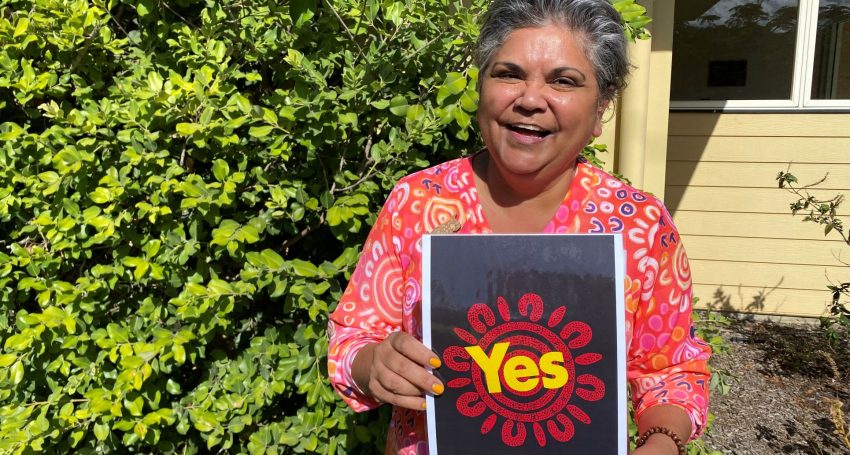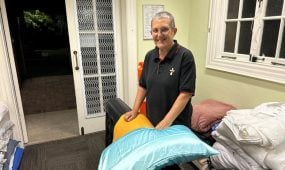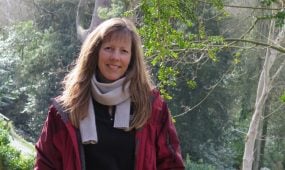Why I am voting “yes” in the referendum: Phyllis Marsh
Justice & Advocacy
“Constitutional recognition of Aboriginal and Torres Strait Islander peoples through a pragmatic Voice to Parliament will elevate the education outcomes of Indigenous young people. Consequently our young people will be able to stand strong in who they are and be given the same opportunities as other Australian students. This is why I am voting ‘yes’ in the referendum,” says MaMu woman Phyllis Marsh, from West Moreton Anglican College

Story Timeline
why i
- Why I support constitutional recognition through an Aboriginal and Torres Strait Islander Voice to Parliament: Aunty Dr Rose Elu
- Why I am voting “yes” in the referendum: Sue Cooke
- Why I am voting “yes” in the referendum: The Ven. Geoff Hoyte
- Why I am voting “yes” in the referendum: Bishop Daniel Abot
- Why I am voting “yes” in the referendum: Adrian Malone
- Why I am voting “yes” in the referendum: The Rev’d Cameron Freese
- Why I am voting “yes” in the referendum: The Rev’d Rick Gummow
- Why I am voting “yes” in the referendum: Uncle Milton Walit
- Why I am voting “yes” in the referendum: Marilyn Wright
- Why I am voting “yes” in the referendum: Barry Kuskopf
- Why I am voting “yes” in the referendum: Aiden Wu
- Why I am voting “yes” in the referendum: Reg Dean
- Why I am voting “yes” in the referendum: Jill Rylatt
Five years ago in the interview for my current West Moreton Anglican College (WestMAC) role, I asked “Can we be bold and innovate towards closing the gap?” Since commencing in my role, the college has consistently listened to me as a pedagogical expert to design the way we approach the teaching about Aboriginal and Torres Strait Islander histories and cultures and how we teach our Indigenous students.
Despite reading novels from the age of six, because I am Indigenous I was automatically placed in the “slow reader” class at school. However, here at WestMAC it’s a given that every Indigenous student has skills and knowledge. They speak in hope of their futures just as other students do. They see the same possibilities, the same social opportunities and a pathway that is equitable.
Advertisement
The college has reached this place because they have listened and consulted. They listen to and consult with me. They listen to and consult with local Yugara Elders. They listen to and consult with Indigenous students’ parents. And, they listen to and consult with Indigenous students.
Listening and consultation are core practices of Aboriginal and Torres Strait Islander cultures. We get the mutual value of listening. We understand the mutual benefits of consultation.
Aboriginal and Torres Strait Islander peoples know their peoples’ needs and have ancient wisdom to share. A Voice to Parliament will ensure that this knowledge and wisdom are listened to by policy makers, thereby helping to close the gap.
Constitutional recognition of Aboriginal and Torres Strait Islander peoples through a pragmatic Voice to Parliament will elevate the education outcomes of Indigenous young people. Consequently our young people will be able to stand strong in who they are and be given the same opportunities as other Australian students. This is why I am voting “yes” in the referendum.
Editor’s note: The Anglican Church Southern Queensland supports constitutional recognition through an Aboriginal and Torres Strait Islander Voice to Parliament. For campaign resources and more information, please visit the YES23 website.
Advertisement
Editor’s note: The Anglican Church Southern Queensland supports the Anglican Board of Mission’s 2017 call for “a Constitutionally Entrenched First Nations Voice”. The ACSQ also supports the Anglican Church of Australia’s Joint Affirmation of Faith and Justice with First Nations Peoples (carried by affirmation at General Synod, Oct 2007), and seeks practical ways to do so, including our association with Reconciliation Australia and the prescribed process of Reconciliation Action Plans.
Editor’s note: 21/07/2023: This anglican focus feature, written by The Ven. Geoff Hoyte, The Rev’d Michael Stalley and The Rev’d Rick Gummow, provides a timeline showing how the ACSQ came to its position on recognising Aboriginal and Torres Strait Islander peoples in the Constitution through a Voice to Parliament.





